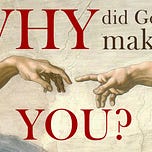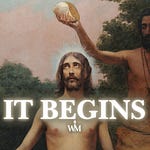
To throw off the spirit of the world, we must know what this spirit is, and where it errs. So we must start at the beginning – with St Ignatius’ ‘Principle and Foundation.’ (Day 1 of True Devotion)
Editor’s Notes
NB: We started the first run of this on 21 November. However, St Louis de Montfort explicitly states that the period does not need to be 33 days exactly. He even discusses a three-day preparation for a renewal of this consecration. As such, those finding this series later should feel free to do join.
The first period of the preparation for St Louis de Montfort’s Total Consecration to the Blessed Virgin is focused on gaining a greater awareness of the spirit of the world, and emptying ourselves of it.
We are starting with the truth about creation, which this worldliness seeks to obscure. We cannot understand how this spirit of the world is wrong, unless we first know what is right.
The themes, as well as vocal prayers and readings associated with this ‘Week 0’, can be found here. You can find the book here.
Although this is part of the Total Consecration preparation, it also stands alone as a great text in its own right.
CONTENTS:
READING: The text consists of the first half of Fr Aloysius Ambruzzi’s commentary on The Principle and Foundation of St Ignatius’s Spiritual Exercises.
MEDITATION: Fr Ambruzzi’s text is intended to provide material for the meditation, which appears in point-form following it. A guide on how to use these points in meditation can be found here.
Reading for Day 1
The Principle and Foundation (Part I)
Man is created to praise, reverence, and serve God our Lord, and by this means to save his soul.
The other things on the face of the earth are created for man to help him in attaining the end for which he is created.
Hence, man is to make use of them in as far as they help him in the attainment of his end, and he must rid himself of them in as far as they prove a hindrance to him.
Therefore, we must make ourselves indifferent to all created things, as far as we are allowed free choice and are not under any prohibition. Consequently, as far as we are concerned, we should not prefer health to sickness, riches to poverty, honour to dishonour, a long life to a short life. The same holds for all other things.
Our one desire and choice should be what is more conducive to the end for which we are created.
Godwards, or the End of Man
A Companion to the Spiritual Exercises of Saint Ignatius
Fr Aloysius Ambruzzi SJ
To man inclined to be self-centred and the master of his own destiny St Ignatius, at the very outset, presents the truth that he is essentially ab alio—a Deo. He is absolutely nothing in himself; God is his Creator and Lord. As a powerful ray of light from the infinite Sun, this truth dissipates the clouds of darkness that often surround man and directs him to the goal of his existence, Godwards. This preliminary consideration of the Saint is called Principium, principle, as the beginning, origin or starting point of thought and action. It is called Fundamentum, foundation, as the basis of the whole of man’s life.
1. God our Creator
Life is a journey from sea to sea—from the sea of our nothingness to that of eternity—across the isthmus of this world. We are not playthings whirled about by unknown and unaccountable forces, or tiny lumps of matter crawling here and there in restless anxiety. We are immortal beings going back to God, the spring of our existence. The world is not a wood savage and rough and strong, with no light to dispel the darkness and no path to guide our steps, but a place of probation and preparation, lit up all round by the eternal light of God.
An infinite Love has fashioned us and placed us in this world. The same Love constantly draws us to Himself through the manifold creatures which half reveal and half conceal Him, till, in Heaven, He makes our hearts throb in unison with His heart and thereby renders us wholly and eternally happy.
The Goodness of God is truly inexhaustible. First, He prepares man’s dwelling. He creates light. He calls the earth into being and causes it to bring forth grass and fruit-bearing trees. He peoples it with every kind of creature. He gathers together the waters under the heavens into the vast expanse of the ocean. He sets lights in the firmament: the sun, the moon, and all the stars.
“And God saw that it was good.” All has come out of His love, a love yearning to communicate itself. The Father has prepared a home for the child that is soon to make its appearance. The Bridegroom has built and adorned the bridal chamber against the nuptial morn.
Then, He creates man. He does not create him like the cattle and the beasts of the earth, nor like the mighty stars in the firmament. The whole Trinity seem to deliberate on this important step.
“And God saw that it was good. And he said, Let us make man to our image and likeness: and let him have dominion over the fishes of the sea, and the fowls of the air, and the beasts, and the whole earth, and every creeping creature that moveth upon the earth.” (Gen. 2.25, 26)
He forms man’s body of the slime of the earth, and into his heavenwards directed face He breathes the breath of life, an immortal soul, as truly a spirit as God Himself. Like God the soul is free from the laws of space and of time, and of all that is called matter. Its activity, like God’s, is all intellect and will, its power is will-power, and its size is greatness of intellect. Like God it is incorruptible and immortal. The soul then is a strict likeness of God, and man can truly and rightly be said to have been created to the image of his Creator.
2. God our Father
God might have left the work of His hands in that state. Man would have loved God as his Creator and Master and, after death, he would have passed to the enjoyment of the happiness of which he was capable. But God’s love knew no bounds. From the first moment He communicated to man a life which is a participation of His very life, and destined him to a state of happiness which he could neither claim nor merit by his efforts: the immediate vision of God. He raised him, and in him, all his descendants, to the level of the Divinity. He made him His son, by implanting in his heart a divine quality, a spark, as it were, of His Divine Nature, which has been called sanctifying grace.
3. The Goal of Man’s Life
Eternal life, however, was to be a gift of God, and at the same time a reward and a crown of justice. God willed that man should reach his end by his own acts. By making proper use of life and of the gifts which accompany life, he was to direct himself to God and prepare himself for that close union with Him which constitutes perfect happiness.
God gives everything to him:
“Behold I have given you every herb bearing seed... and all trees... to be your meat.” (Gen. 1.29)
“And the Lord took man, and put him into the paradise of pleasure, to dress it and to keep it.” (Gen. 2.15)
To rule over the fishes of the sea, the fowls of the air and all living creatures that move upon the earth, and be subject in everything to the Will of his Creator and Father, was man’s task in this life and the only way to reach eternal life.
4. Adoration, praise and submission
In the very first pages of Holy Writ, God wants to impress deeply on us the rules and principles that are to direct our whole life.
God alone is the one that is, the Self-subsistent Being, Who has deigned to be our Creator: we are His creatures, entirely dependent on Him. Not to be like Satan, of whom our Lord said that “he stood not in the truth,” (John 8.44) we must constantly adore and revere our Creator and Lord, i.e., we must confess and acknowledge His absolute Being and our essential dependence on Him, interiorly by the sincere abasement of our soul, and exteriorly by the homage of our body.
God is our Heavenly Father Who, with infinite love and pity watches over us, His creatures, and never ceases to impart to us His gifts, however ungrateful and rebellious we be.
We owe Him an ever-increasing debt of praise and thanksgiving.
“Bless the Lord, O my soul: O Lord, my God, Thou art exceedingly great.” (Ps. 103.1)
“What shall I render to the Lord, for all the things that He hath rendered to me?” (Ps. 115.12)
God is the supreme Master and Lord: His Will is the rule to which every one of His creatures must conform itself—most of all, intelligent creatures.
“Of every tree of paradise thou shalt eat: but of the tree of knowledge of good and evil, thou shalt not eat. For in what day soever thou shalt eat of it, thou shalt die the death.” (Gen. 2.16-17).
5. The saving of my soul
The saving of my soul, salus animæ, means the health and perfection of it. In proportion as I live for my end—adore and praise God, and submit my will to His Holy Will—I am spiritually well and bringing my soul finally to that state in which I shall be perfectly and eternally well and happy.
“Human nature,” says St Thomas Aquinas, “can never be perfected unless it be united to God.” Helped by divine grace, it is in our power to achieve such union by submitting our intellect and our will to God’s Reason and Law. By acting independently of God we inevitably bring about our own ruin.
Accordingly, absolute dependence on God, grateful acknowledgement of His loving kindness, and perfect submission to His Holy Will sum up the whole of religion and sanctity. Therein lies order, beauty, happiness, and Heaven itself.
E in la sua volontade è nostra pace. (Dante, Paradise 3.85)
(And in his will, is our peace.)
6. My Lord and my Father!
God’s creative act is not a thing of the distant past. It is an eternal and ever present act, prompted, in some true sense, by the love God bears me.
“The creative act of God is going on at this instant, inasmuch as all the power that God put forth to make the universe originally be at all, is still put forth to sustain that universe in its being and in its activities. The universe of matter has not become less dependent of God for being millions [sic] of years old; nor is my soul less dependent on Him because it is forty or fifty or sixty years since it first came to be by His creative breath.” (Rickaby, Waters that go softly, p. 6)
Every moment, accordingly, is a new creation. Now God creates and maintains the world for me. Now He creates and conserves me and gives me a share of His creatures for my use and for His service. Now He imparts to me His deifying grace. Must I not look upon myself and the whole world as beings that absolutely depend on God, and on myself, in particular, as the constant object of His infinite love and mercy?
“Who are carried by my bowels, are borne up by my womb.” (Is. 46.3)
Should I not make God the object of every aspiration of mine, never not even for a moment, turning away from Him or departing from His Law?
God, the supreme goal of my life
(Suggestions for the colloquy)
1. Thou hast made me, O God! Thou unceasingly supportest me! Thou art the first cause of even the least good thing I do! By Thy infinite love and mercy Thou hast made me a partaker of Thy Divine nature—a brother of Christ, Thy Son. Of myself I am absolutely nothing—I have nothing but imperfections, miseries, and sins. I can but sin and spoil the work of Thy hands in me and in others. Thou alone art the Absolute Being—Eternal, Infinite, Almighty—Father, Son, and Holy Ghost, One God in Three Persons—the fountain and origin of all good things.
2. O my God, make me intimately feel my utter dependence on Thee, my Creator and my All, that I may ever worship and adore Thee in spirit and in truth! Our Father, Who art in Heaven, hallowed be Thy Name!
3. O my God, grant that I may know Thy infinite Greatness and Beauty and Thy never failing goodness to me—in order that I may constantly raise to Thee the hymn of joyful praise and of heartfelt thanksgiving. We praise Thee, we bless Thee, we adore Thee, we glorify Thee, we give Thee thanks.
4. O my God, give me grace and strength that every thought, desire and action of mine may be prompted by a sincere desire to please Thee and be united to Thee, O Infinite Wisdom and Goodness. Thy will be done, on earth as it is in Heaven.
Meditation for Day 1
It is in mental prayer that that much of the preparation will be achieved – and meditation is a means of entering mental prayer. See our guide to meditation for two ways to use the below texts.
The Preparation
Put away distractions and place yourself in the presence of God. (“Most holy and adorable Trinity, etc.”) Bring also the Blessed Virgin to mind, place yourself before her and ask for her assistance.
Humble yourself before God, recalling what we are in relation to God.
Say a preparatory prayer (“O my God and Sovereign Lord, etc.”)
Consider the First Prelude – call to mind the scene, theme, subject or tone of the meditation. Do not get hung up on imagining scenes if this is difficult for you.
“The first Prelude is to hear God say, on completing the work of material creation, ‘Let us make man to our image and likeness.’” (Fr Ambruzzi)
Consider the Second Prelude – Consider what you want from this meditation (e.g., faith, contrition, charity, temperance, knowledge of God, etc.), and ask for it.
“The second Prelude is to ask for light that I may truly know my origin, the object of my life here and my eternal end hereafter, and for grace that I may direct all my thoughts, words, and actions to this end.” (Fr Ambruzzi)
The Points for Meditation
First Point: “Man is created to praise, reverence, and serve God our Lord…” This is the purpose of my existence.
Second Point: “… and by this means to save his soul.” The eternal happiness signified by “save his soul” is both the purpose of my existence, and the reward which God offers me.
Third Point: “The other things on the face of the earth are created for man to help him in attaining the end for which he is created.” This is the reason all things in the world exist: to assist man in praising, reverencing and serving God, and by this means save his soul.
One could consider these points in reference to oneself: How far have we been conscious of these truths in our daily lives so far, what practical conclusions should we draw from these truths, how far have we lived up to them so far, what must we do to live up to them in the future, etc.
One could consider the acts of virtue we can make in response to these truths – Acts of faith, humility, hope/confidence, thanksgiving, contrition and love – talking all the while to God, the Blessed Virgin, our Guardian Angels, etc.
Consider whether any practical resolutions can be drawn from these reflections, and ask God to help with them.
The Colloquy
The points of the meditation are intended to lead us to the colloquy, by which he means speaking to Our Lord, the other persons of the Holy Trinity, Our Lady, or any other of the saints.
Fr Ambruzzi offers some suggestions for colloquies (see above), but it is important to speak frankly to God in our own words, rather than simply reading somebody else’s.
If one feels moved to speak to God before meditating on all the points, one should certainly do so. The same applies if one feels moved to simply rest in God, rather than engaging in discursive meditation. These impulses should be followed over any particular method of meditation.
The End
End the meditation with a vocal prayer – such as the Our Father, the Anima Christi. Prayers from the Byzantine Paraclisis may be fitting for this 33-day preparation – for example:
O most holy Mother of God, save us!
Many temptations have surrounded me, O Virgin. To thee I come for shelter and salvation. O Mother of the Word, do thou deliver me from all troubles and afflictions!
O most holy Mother of God, save us!
The assaults of my passions disturb me: they fill my soul with great discouragement. O Maiden preserved from all stain, do thou restore the balance of my soul through the peace of thy Son, through the peace of thy God!1
Reflect on how well we have prayed, and how well we have followed our chosen method.
Select a spiritual nosegay from your meditation to keep with you for the rest of the day.
See you tomorrow for Day 2. Hit subscribe to make sure you don’t miss it or any of our other material:
For more on the St Louis de Montfort’s True Devotion and Total Consecration, for which we are preparing, see here:
The theological basis of ‘True Devotion’ and the Consecration to Mary (Garrigou-Lagrange)
The fruits of ‘True Devotion’ and Consecration to Mary (Garrigou-Lagrange)
For more on the importance of not getting bogged down with methods, and on allowing God to act, see here:
For more on Week 0, and the vocal prayers that are are suggested for each day, see here:
‘Week 0’ of St Louis de Montfort’s Total Consecration preparation (Prayers, practices and reading)
Get the book here:
True Devotion to the Blessed Virgin Mary (St Louis de Montfort)
HELP KEEP THE WM REVIEW ONLINE WITH WM+!
As we expand The WM Review we would like to keep providing free articles for everyone.
Our work takes a lot of time and effort to produce. If you have benefitted from it please do consider supporting us financially.
A subscription gets you access to our exclusive WM+ material, and helps ensure that we can keep writing and sharing free material for all.
You can see what readers are saying over at our Testimonials page.
(We make our WM+ material freely available to clergy, priests and seminarians upon request. Please subscribe and reply to the email if this applies to you.)
Subscribe to WM+ now to make sure you always receive our material. Thank you!
For a daily reminder of why God made you, from the good old Penny Catechism…
… and if you are enjoying this preparation for Total Consecration, why not get it in mug form?
Follow on Twitter, YouTube and Telegram:
Twitter (The WM Review)
These prayers are drawn from the ‘Office of Consolation’ or the Small Paraklesis (Παράκλησις, “supplication” or “comfort”), a service of intercession addressed to the Theotokos, and written by Theophanes/Theosterictus the Monk in the 9th century. The texts have been lightly adapted from the Melkite Byzantine Daily Worship.
The Paraklesis is chanted in times of distress and sorrow of soul, and daily during the first fourteen days of August in preparation for the feast of the Assumption. It is among the most beloved devotions of the Byzantine tradition.
We are offering a selection of these prayers to be used as readers see fit – at the start or end of meditation, for morning or evening prayer, or at any other time.











